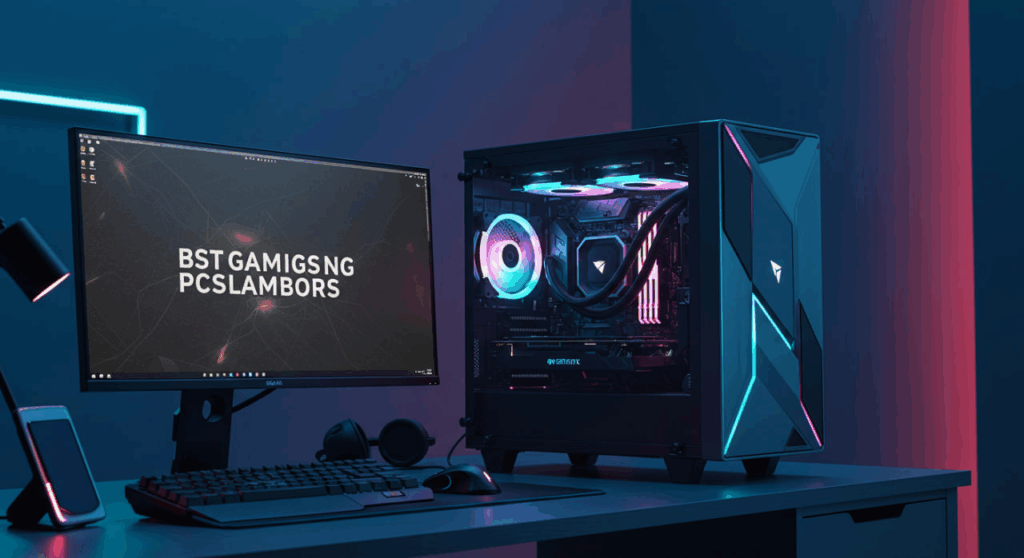The gaming industry has evolved dramatically, and 2025 is a thrilling time to dive into the world of high-performance gaming PCs. Whether you’re a casual gamer looking to enjoy the latest titles or a competitive esports enthusiast chasing ultra-smooth frame rates, choosing the right gaming PC can make or break your experience. With cutting-edge hardware, innovative cooling solutions, and sleek designs flooding the market, the options can feel overwhelming. This comprehensive guide breaks down the key components, top models, and essential considerations to help you find the perfect gaming PC that balances performance, aesthetics, and budget.
Why Invest in a Gaming PC in 2025?
Gaming PCs have become the gold standard for immersive gaming experiences, offering unparalleled power and flexibility compared to consoles. In 2025, advancements in processors, graphics cards, and display technologies have pushed the boundaries of what’s possible. From ray-tracing that delivers lifelike visuals to lightning-fast SSDs that slash loading times, a gaming PC lets you experience games as developers intended. Plus, PCs are versatile—beyond gaming, they can handle content creation, streaming, and even AI-driven tasks. But with great power comes a dizzying array of choices, so let’s explore what makes a gaming PC stand out.
Key Components to Consider
Building or buying a gaming PC requires understanding its core components. Each part plays a critical role in performance, and knowing what to prioritize ensures you get the most bang for your buck.
Processor (CPU): The Brain of Your PC
The CPU is the heart of any gaming PC, handling everything from game logic to AI calculations. In 2025, AMD Ryzen 9 7950X3D and Intel Core i9-14900K lead the pack. AMD’s 3D V-Cache technology excels in gaming, delivering up to 15% better performance in CPU-intensive titles like Starfield or Cyberpunk 2077. Intel, on the other hand, shines in multitasking and productivity tasks, making it ideal for streamers or content creators. For mid-range builds, the AMD Ryzen 5 7600X or Intel Core i5-14600K offer excellent value without sacrificing gaming prowess.

Graphics Card (GPU): The Visual Powerhouse
The GPU is arguably the most critical component for gaming, rendering everything from sprawling open worlds to intricate particle effects. NVIDIA’s GeForce RTX 5090 dominates in 2025, with its 21,760 CUDA cores and 32GB of GDDR7 memory, perfect for 4K gaming with ray-tracing maxed out. AMD’s Radeon RX 8800 XT is a strong contender for budget-conscious gamers, offering stellar 1440p performance at a lower price point. If you’re on a tight budget, the NVIDIA RTX 4060 Ti still delivers smooth 1080p gaming for most modern titles.
RAM and Storage: Speed and Capacity
For RAM, 16GB is the minimum for gaming in 2025, but 32GB is ideal for future-proofing, especially if you multitask or stream. DDR5 RAM, with speeds up to 7200MHz, is now standard in high-end builds, offering faster data access. For storage, NVMe SSDs are non-negotiable—games like Baldur’s Gate 3 load in seconds with a Gen 5 SSD like the Samsung 990 Pro. Pair it with a 2TB HDD for bulk storage, and you’re set for a growing game library.
Cooling and Case: Keeping It Cool and Stylish
Modern gaming PCs push components to their limits, generating significant heat. Liquid cooling solutions, like the NZXT Kraken X73, keep high-end CPUs and GPUs in check, while air cooling remains viable for mid-range builds. Cases like the Lian Li PC-O11 Dynamic offer excellent airflow and stunning RGB aesthetics, letting you showcase your build. Don’t skimp on cooling—overheating can throttle performance and shorten component lifespans.
Top Gaming PCs to Consider in 2025
With components in mind, let’s review some of the best pre-built gaming PCs available this year, catering to different budgets and needs.
Alienware Aurora R16: The Premium Powerhouse
Alienware’s Aurora R16 is a beast, blending futuristic design with top-tier performance. Powered by an Intel Core i9-14900KF and NVIDIA RTX 5090, it handles 4K gaming with ease, delivering over 120 FPS in demanding titles like Black Myth: Wukong. Its 64GB of DDR5 RAM and 2TB NVMe SSD ensure lightning-fast multitasking and storage. The Aurora’s advanced liquid cooling and customizable RGB lighting make it a showstopper, though its $3,500 price tag is a premium investment. Perfect for enthusiasts who want the best without building their own rig.
ASUS ROG Strix G16: The Mid-Range Marvel
For gamers seeking value without compromise, the ASUS ROG Strix G16 is a standout. Equipped with an AMD Ryzen 7 7800X3D and NVIDIA RTX 4070 Ti, it delivers silky-smooth 1440p gaming. Its 32GB DDR5 RAM and 1TB SSD provide ample speed and storage, while the compact chassis with vibrant RGB accents fits any setup. Priced around $1,800, it’s an excellent balance of performance and affordability, ideal for gamers who want high settings without breaking the bank.
HP Omen 25L: The Budget Champion
The HP Omen 25L proves you don’t need to spend a fortune for great gaming. With an Intel Core i5-14400F and NVIDIA RTX 4060, it handles 1080p gaming effortlessly, hitting 60+ FPS in most modern titles. Its 16GB DDR5 RAM and 512GB SSD are upgradeable, making it a future-proof starter PC. At $999, it’s a steal for casual gamers or those new to PC gaming, though its air cooling may struggle with prolonged heavy loads.
Custom vs. Pre-Built: Which Is Right for You?
Deciding between a custom-built PC and a pre-built one depends on your expertise and priorities. Custom builds offer complete control over components, letting you optimize for specific games or budgets. They’re often cheaper for the same performance but require technical know-how and time. Pre-builts, like the Alienware or ASUS models, are plug-and-play, with warranties and customer support, but you’ll pay a premium for convenience. If you’re new to PCs or short on time, pre-builts are the way to go; seasoned builders will relish the flexibility of a custom rig.
Tips for Future-Proofing Your Gaming PC
Technology evolves rapidly, so future-proofing is key. Opt for a motherboard with extra PCIe slots and RAM capacity for upgrades. Choose a power supply (PSU) with at least 750W to handle next-gen GPUs. Modular PSUs, like the Corsair RM750x, make cable management a breeze. Finally, invest in a high-refresh-rate monitor (144Hz or higher) to fully leverage your PC’s power—4K is great, but 1440p at 240Hz is a sweet spot for competitive gaming.
The Importance of Peripherals
A gaming PC is only as good as the peripherals you pair it with. A mechanical keyboard, like the Razer BlackWidow V4, offers tactile feedback for precise inputs. A high-DPI mouse, such as the Logitech G Pro X Superlight 2, ensures pinpoint accuracy in fast-paced shooters. Don’t overlook audio—headsets like the SteelSeries Arctis Nova Pro Wireless deliver immersive soundscapes, crucial for games with atmospheric audio. A quality monitor, like the Samsung Odyssey G8 OLED, complements your PC with vibrant colors and low input lag.
Conclusion
Choosing the best gaming PC in 2025 comes down to balancing performance, budget, and personal needs. Whether you opt for the powerhouse Alienware Aurora R16, the versatile ASUS ROG Strix G16, or the budget-friendly HP Omen 25L, there’s a rig for every gamer. By prioritizing key components like the CPU, GPU, and cooling, and considering future upgrades, you can build or buy a PC that delivers unforgettable gaming experiences. Pair it with top-notch peripherals, and you’re ready to dominate virtual worlds.
FAQ
What is the minimum budget for a good gaming PC in 2025?
A solid gaming PC starts at around $800-$1,000. Models like the HP Omen 25L offer reliable 1080p performance at this price, though spending $1,500-$2,000 gets you better longevity with 1440p or 4K capabilities.
Should I choose AMD or Intel for gaming?
Both AMD and Intel offer excellent gaming CPUs in 2025. AMD’s Ryzen 9 7950X3D is ideal for pure gaming due to its 3D V-Cache, while Intel’s Core i9-14900K excels in multitasking. For mid-range builds, AMD’s Ryzen 5 7600X often offers better value.
Is 16GB of RAM enough for gaming?
Yes, 16GB is sufficient for most games in 2025, but 32GB is recommended for future-proofing, especially if you stream or run multiple applications alongside gaming.
Do I need liquid cooling for a gaming PC?
Liquid cooling is essential for high-end builds with powerful CPUs and GPUs to prevent thermal throttling. For budget or mid-range PCs, quality air cooling can suffice, but ensure proper airflow in the case.
Can I upgrade a pre-built gaming PC?
Most pre-built PCs, like the ASUS ROG Strix or HP Omen, are upgradeable. Check for available RAM slots, storage bays, and PSU wattage to ensure compatibility with future components.



